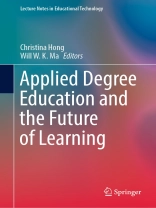This book draws on the responses to learning and teaching and applied education futures thinking, that provide insights into the future of learning. It brings together more than 30 novel and important applied research and scholarly contributions from around the world, including Australia, Canada, Finland, Germany, Hong Kong, Japan, Macau, Mainland China, Malaysia, Morocco, Pakistan, and the UK. The chapters, including reflective essays and practice-based case examples, are divided into five major themes:
• Future ready values and competencies for the future of work
• Innovative pedagogies in applied degree learning and training
• Driving student access, engagement, and success through digital technologies
• Intelligent technologies: Embedding the new world of work into applied degrees
• Lifelong learning, partnering, and the future of work
This book is important for readers interested in international perspectives on the future of work and professional education.
İçerik tablosu
The Case for Applied Degree Education: The Future of Learning for the New World of Work.- Preparing Engineers for 2035: Transforming Australia’s Engineering Education for Emerging Roles and Expectations.- A New Norm of Learning: Accommodating 21st Century Learner’s Needs.- The structure of Domain-specific Competence in the Occupation of Technicians at Vocational Schools in Germany.- Futures Literacy: The Concept and its Potential Application in Applied Degree Education.- Creativity under COVID-19: How Technology has Enhanced and Promoted Student Engagement Online.- Competency-based Workplace Learning and Assessment: A Framework and Models for Future Research.- Embedding Uncertainty in the Learning Process – An Evaluation Case-study of VUCA Model in Education.- Remote Teaching and Learning in Applied Engineering: A Post-Pandemic Perspective.- Applying Hybrid Mode in Different Pedagogical Approaches on Design-related Tertiary Education Programmes in Hong Kong.- An Investigation of Using Blended Learning Pedagogy to Sustain Student Interest in Basic Science Subjects.- Budding the Next Entrepreneur in their Final Year Project – a Teaching Pedagogy Case Study to the Business and Technology Students in their Medical, and Logistics Innovation during COVID-19.- Does Online Practice based on an Adaptive Curriculum Work better than Written Feedback for EAP.- Improving Students’ Learning Experience Using Simulation Software in Applied Degree Education.- Developing an Online Practicum in Professional Education: A Case study from UK Teacher Education.- New Intervention Strategy in Teaching and Learning under COVID-19 Pandemic: Nursing Simulation on Health Worker Training in Tertiary Education of Hong Kong.- A Reflection Case to Covid-19 Pandemic: Online Learning Experience. Product Design Education in the Wake of COVID-19: New Technologies Enabling Experiential Learning Relevant to Future Practices.- How do Moroccan Higher Education Students Behave during the Remote Education in Time of COVID-19?.- Technology-Enhanced Student-centric Learning in Information and Multimedia Technologies in the New Normal Era.- Enhancements of Vocational Students’ Engagement of Workplace Learning in the Industry-university Collaboration Learning Environment: A Case Study in the Great Bay Area.- Engaging Students through Technology-enhanced Interactive Activities outside the Classroom.- Reflexivity on Delivering Experiential Learning before and since Coronavirus Pandemic.- COVID-19 and Contactless Learning and Teaching: The Impact of Active Participation and User Acceptance.- Making Connections between Work and Study – Maximising the Value of Degree Apprenticeships.- Re Engineering the Food Industry: Where do We Go from here?.- The Relevance of Applied Education to Urban Sustainability: A Case Study of a Degree Programme in Horticulture, Arboriculture and Landscape Management in Hong Kong.- From Deindustrialization to Reindustrialization: A Repositioning of Vocational Education and Training for Improving Synergy and Connection within Social Structure in Hong Kong.- Globalisation and the Massification of Higher Education in the Hong Kong Context: Dealing with the Challenges of Globalization.- Facilitating Transformational Change in Applied Degrees in Engineering: A BRAVE New World.
Yazar hakkında
Professor Christina Hong, Ph.D., is President of Technological and Higher Education Institute of Hong Kong (THEi). She has a strong background in educational management and leadership with an emphasis on organizational change management, curriculum transformation, technology-enhanced learning, and teacher praxis across the school, VET, and higher education sectors. Her prior roles include senior executive roles in the TAFE and university sectors in Australia as well as national educational reform and leadership roles in New Zealand. She is particularly interested in how tertiary institutions foster C21st employability skills, the dynamic of innovation ecosystems, and collaboration through internationalization and applied research activities. Together with Dr Will Ma, she has co-edited two thematic publications: Applied degree education and the future of work (2020) and this current edition.
Will W. K. Ma, Ph.D., is Head of the Learning Commons & Digital Innovation, Technological and Higher Education Institute of Hong Kong (THEi). The Learning Commons & Digital Innovation is responsible for providing physical learning space, information technology services, physical and online learning resources for staff and students to promote applied research and to enhance learning. He is also a champion of staff development, especially in technology-enhanced learning. His research focuses on the use of information systems for communication, knowledge sharing, and knowledge creation. He has publications in Computers & Education, Computers in Human Behavior, Journal of Computer Assisted Learning, International Journal of Communications, Law and Policy, and Information & Management. He was Co-editor of the Journal of Communication and Education (2015-Present) and Editor of Cogent Social Sciences (2017-2019).












